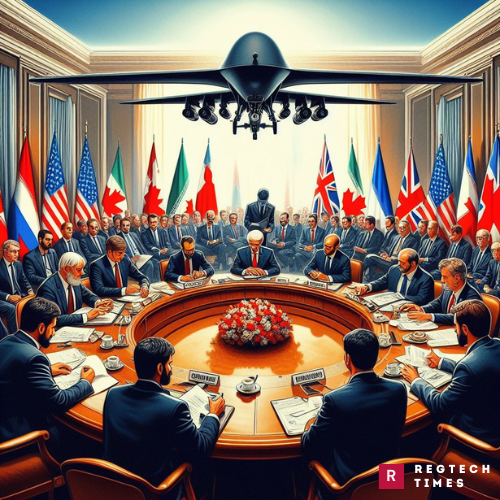On April 28, 2024, the Iranian Foreign Ministry issued a statement strongly condemning the newly imposed missile sanctions. These sanctions specifically target Iranian individuals and companies associated with the country’s drone and missile industries. The move by the US, UK, and Canada underscores their concern over Iran’s actions and its role in regional security dynamics.
Explanation of Sanctions:
Sanctions represent a key tool in the realm of international relations, employed by governments or international bodies to impose penalties or restrictions on a targeted country, entity, or individual. These measures are typically enacted in response to behaviors or actions deemed unacceptable by the sanctioning parties. Sanctions can take various forms, including economic sanctions, trade embargoes, arms embargoes, travel bans, diplomatic sanctions, and financial sanctions.
Explanation of Drone and Missile Sanctions:
Drone and missile sanctions refer to punitive measures imposed by governments or international bodies specifically targeting individuals, companies, or entities involved in the development, production, or proliferation of unmanned aerial vehicles (drones) and ballistic missiles. These sanctions are typically enacted in response to perceived threats to regional or global security posed by the proliferation or use of such weapons systems.
Targeted Entities and Individuals:
Drone and missile sanctions typically target entities and individuals directly involved in the development, production, or deployment of drones and missiles, as well as those providing financial or technological support to such activities. This may include manufacturers, suppliers, research institutions, government agencies, and individuals associated with the procurement or operation of drones and missiles.
Iran’s Response:
Foreign Ministry Spokesman Nasser Kanaani expressed Iran’s position on the matter. He emphasized that Iran’s military capabilities, including its missile program, are proportionate to its need for national security, sovereignty, and territorial integrity. Furthermore, he asserted Iran’s right to self-defense against any foreign threat or aggression, which includes the recent missile sanctions imposed by the US, UK, and Canada. Kanaani’s statement highlights Iran’s determination to protect its interests and people, even in the face of international pressure.
International Partnerships and Regional Stability:
Despite the tensions, Kanaani underscored Iran’s role as an important partner in ensuring regional and global peace and security. This statement reflects Iran’s desire to maintain diplomatic channels and engage constructively with the international community. However, the recent sanctions have not deterred Iran from its commitment to strengthening its national power—a stance it views as both legitimate and decisive.
Double Standards and Regional Insecurity:
Kanaani did not shy away from criticizing the European Parliament’s resolution, particularly in light of the missile sanctions. The resolution condemned Iran’s drone and missile attack on Israel and called for further sanctions. According to Kanaani, the European Parliament’s approach lacks consistency. While it condemns Iran’s actions, it seemingly turns a blind eye to Israel’s occupation, alleged violations of international laws, and its actions in the Middle East. This double standard, as perceived by Iran, adds to the existing tension and insecurity in the region.
The Role of the US and European Countries:
Kanaani also pointed out the attempts by the US and certain European countries to “fan the flames of conflicts” rather than actively working to de-escalate the situation. This critique highlights the delicate balance between maintaining stability and addressing legitimate concerns. As the situation unfolds, the actions of key players will continue to shape the dynamics in the Middle East.
Conclusion:
The recent missile sanctions imposed by the US, UK, and Canada have heightened geopolitical tensions surrounding Iran’s actions, underscoring the complexities of global security dynamics. While Iran asserts its right to self-defense, the international community grapples with finding a balanced response. Amidst criticisms of double standards and accusations of exacerbating conflicts, the path forward necessitates a commitment to dialogue and diplomacy. As key players navigate this delicate situation, the world watches with a keen eye on the evolution of Middle Eastern dynamics and the pursuit of lasting peace and stability.



